Enjin is a project that has been growing at a rapid pace. This gaming community supports over 300,000 gaming communities, with 20 million registered gamers. It is an impressive project, well worth an Enjin Coin review.
Since 2009 Enjin has enabled gamers to create websites for clans and guilds, create forums, add wikis, chat groups, and much more. And in 2017, they held an ICO to bring their technology onto the blockchain and add innovative new features.
However, is the Enjin Coin still worth considering?
In this Enjin Coin review, I will attempt to answer that by taking an in-depth look. I will also analyse the long-term adoption potential and use cases of the ENJ token.
You can also check out Guy's take on the Enjin ecosystem in his Enjin Review video.
What is Enjin?
Enjin is an ecosystem focused on easing the process of creating and running NFT-powered games on the blockchain. It helps game studios focus on the game development process by simplifying the blockchain side of things. In addition, Enjin creates an end-to-end suite of tools that gamers and game developers can use to make the blockchain gaming process seamless. This includes a myriad of software development kits (SDKs) that allow users to easily build items and integrate them into games or applications.
The Enjin Network allows developers to build on Ethereum and leverage its security while avoiding the crazy gas costs through its scaling solution called ‘JumpNet’. Furthermore, the platform and its tools are completely free-to-use with the only condition of requiring some ENJ tokens for minting NFT assets. By providing these tools, Enjin has created a robust ecosystem and community of games, game studios and gamers all connected to each other through its token, the Enjin Coin (ENJ).
In 2023, Enjin also announced the launch of the Enjin Blockchain, a specific blockchain engineered for NFTs and other digital assets at the protocol level without the need to piggyback off of the Ethereum network. It is custom-built by the Enjin team with NFT-specific functions at the protocol level and features an end-to-end, user-friendly application layer that can be integrated.
Enjin Coin (ENJ) is proposed to migrate from the Ethereum network to become the native token of the Enjin Blockchain's Mainnet on a 1:1 basis
What is Enjin Coin?
Enjin crypto still exists as an ERC-20 token built on the Ethereum network, though will be migrating to the Enjin Blockchain in the near future.
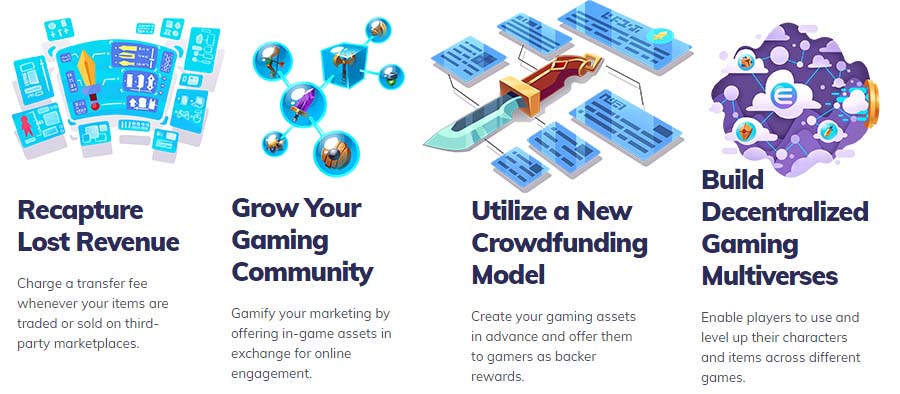 Use Cases for the Enjin Platform
Use Cases for the Enjin PlatformOne huge benefit being promoted by Enjin is that by bringing gaming onto the blockchain, they will be able to help gamers avoid the extremely high levels of fraud prevalent in the transfer of virtual goods.
Enjin has also broken ground on a few firsts within the crypto ecosystem. For example, it has become one of the first projects to test the capabilities of Ethereum’s Raiden Network, secured a Polkadot Parachain slot, and was the first gaming token to pass regulatory approval in Japan.
The Enjin team has plans for dozens of features through its public SDKs and APIs, but in the spirit of brevity, I’m only going to be touching on the major features in this article.
In June 2023, Enjin made the announcement that they will be launching their own blockchain network, and ENJ will be migrating from the Ethereum network to the Enjin Blockchain Mainnet on a 1:1 basis.
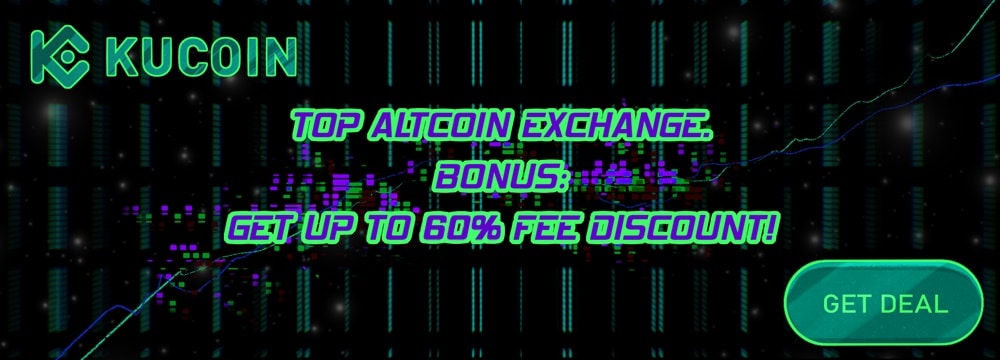
Virtual Goods
The biggest value Enjin is hoping to bring to the gaming community with its token is in the area of virtual goods. Developers can create coins specific to their own community using the included tools. These coins will be backed by the Enjin Coin. This adds to the benefits of the blockchain while retaining the branding and feel of the respective platforms.
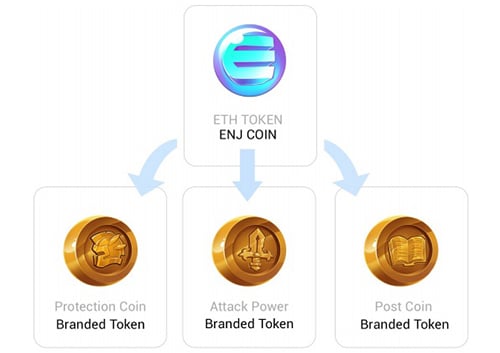 Enjin Virtual Goods. Source: Enjin Whitepaper
Enjin Virtual Goods. Source: Enjin WhitepaperThe fact that items will be recorded on a single registry smart contract means any items added to the blockchain will be recognized by every Enjin wallet. This will interconnect the entire ecosystem, allowing for assets to be transferred anywhere on the platform.
This could become especially important as new games are developed specifically for the blockchain, giving developers the ability to create single assets that work in multiple games.
Efinity
Efinity is Enjin's inter-operability-focused product built as a 'parachain' on the Polkadot ecosystem. It now also exists as a matrixchain on the Enjin Blockchain. Efinity aims to be a decentralised cross-chain protocol that will allow users to bridge NFTs to Polkadot, and exist natively on Enjin. It encourages users to do so by rewarding them with its native 'EFI token' for participating in network activity that includes governance, maintenance, development, adoption and utilisation.
As an interesting side note, along with Enjin (ENJ), Efinity (EFI) has also cleared regulatory approval in Japan by the Japan Virtual and Crypto-assets Exchange Association, making. The ENJ token itself became the first approved metaverse/gaming token as well in 2021. It looks like the United States could learn a thing or two from the Japanese about how to regulate digital assets.
The first version of the Efinity parachain is focused on core functionality and chain stability, allowing creators to mint up to 2,200 tokens to separate wallets per transaction. Efinity will process up to 700-1,000 transactions per second (TPS) based on current benchmarks. TPS may be increased in the future as the Efinity and Polkadot runtime code is optimised.
Efinity is also developing a unique token standard called 'paratokens'. Paratokens are tokens that can freely move between the different parachains in the Polkadot and Kusama ecosystem. To achieve this, paratokens on Efinity will employ Direct Cross-Chain Message Passing (XCMP) to transfer between parachains on Polkadot and Kusama and enable cross-chain development in the Polkadot ecosystem. On Efinity, developers will be able to build and deploy smart contracts using Ink!, a smart contract framework compatible with all Polkadot-based chains.
Among the host of features that Efinity offers, there are five key features that it boasts of:
 Efinity's Cross Chain Bridge Mechanism
Efinity's Cross Chain Bridge Mechanism - Cross-Chain Bridge- Efinity’s cross-chain bridge will allow users to import tokens created on other chains to Efinity. Currently, only an Ethereum bridge developed by Snowfork is in the plans. However, with continued development, new bridges to other chains can be supported.
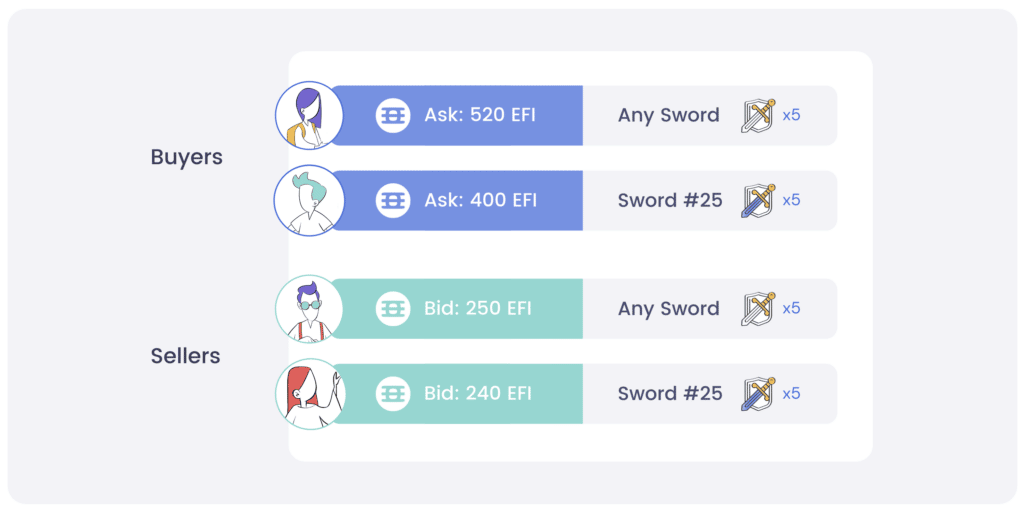 Efinity's Marketplace Mechanics
Efinity's Marketplace Mechanics - Marketplace- Efinity’s Marketplace provides a comprehensive set of tools for buyers and sellers to create and fill orders for any token. Unlike other NFT marketplaces, Efinity’s marketplace encourages price discovery. Specifically, tokens don’t even need to be listed for sale (or even exist on the network) to receive a bid. In fact, users are encouraged to maintain the highest bid on any token. The highest (unfilled) bid on any token receives a portion of fees and gains weight in the Price Discovery Pool over time for any transactions using that token, incentivizing price discovery.
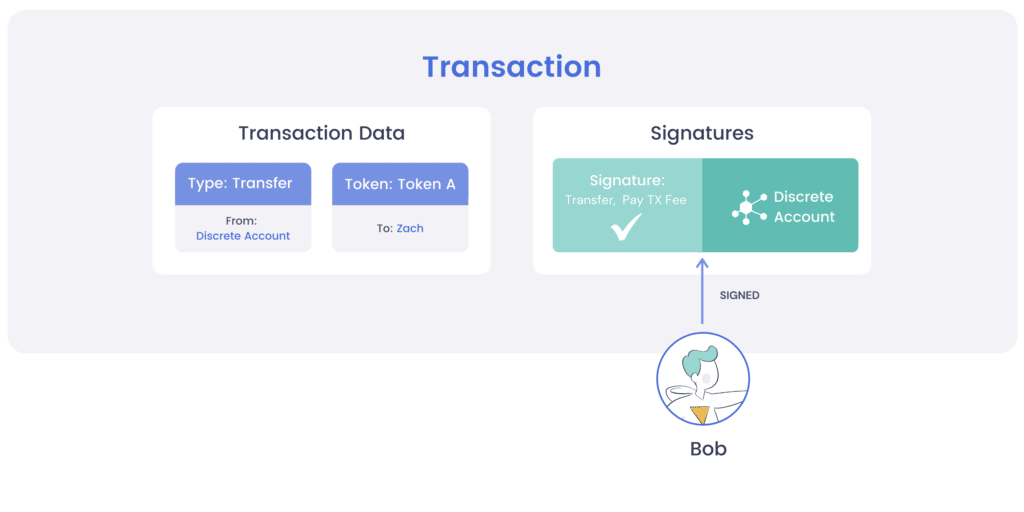 Efinity Discrete Accounts
Efinity Discrete Accounts- Discrete Accounts- Discrete Accounts are unique addresses that can be created and operated on the parachain. They do not have an associated private key. A discrete account’s address can be used in any transaction as long as it is signed by a wallet that is allowed to use the discrete account. Discrete accounts are especially useful for teams building on top of Efinity. These teams can use discrete accounts to standardize the address from which the assets are created or transferred while allowing multiple team members varying degrees of access to the discrete account. To give a more relatable example of the concept, liken the functioning of discrete accounts to Discord servers. Both are created by one person but can be controlled and used by many others. Like Discord servers, the wallet address creating the discrete account can set permissions and delegate roles (Owner, Admin, Operator) to different wallet addresses. Each role is allowed a unique set of permissions on the discrete address. Game developers may also use discrete accounts to onboard new players without making them set up a wallet or buy additional crypto just to play the game.
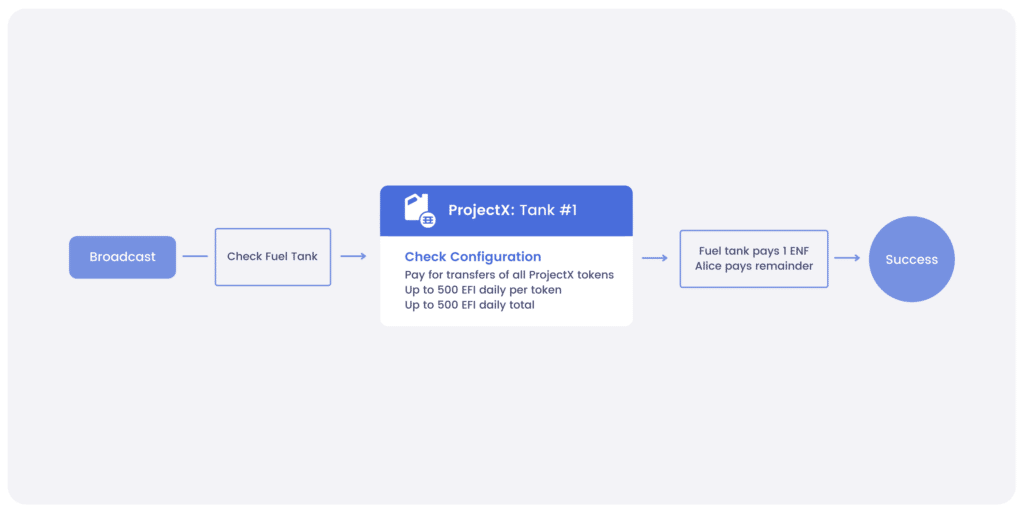 Efinity Fuel Tank
Efinity Fuel Tank- Fuel Tanks- Fuel Tanks are a special feature of Efinity that allows projects to subsidize the cost of transactions on Efinity for their users. Fuel Tank addresses are special discrete accounts set up by projects to pay transaction fees on behalf of the project's users. EFI tokens deposited into these fuel tanks are non-withdrawable. A fuel tank can whitelist specific tokens, tags, transaction types or users that will be permitted to use it.
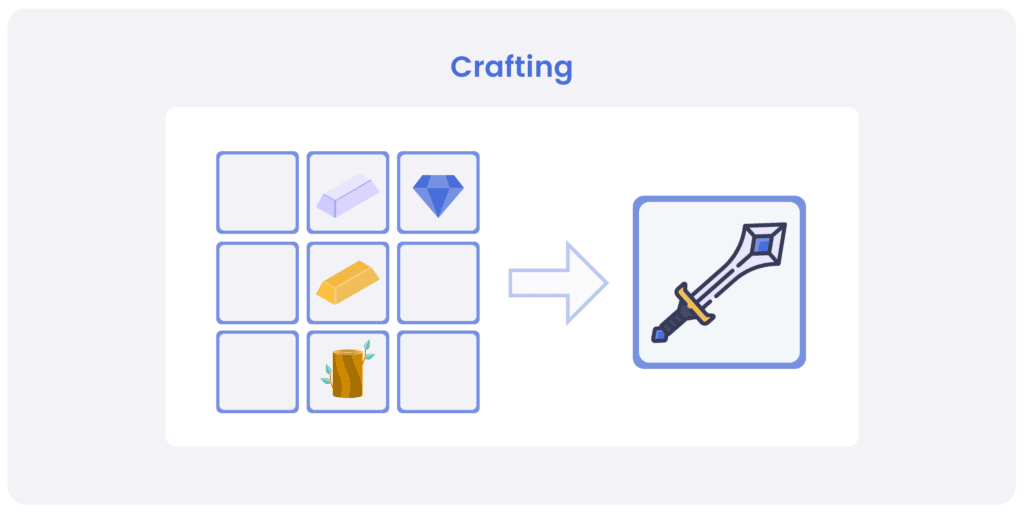 Efinity Crafting
Efinity Crafting- Crafting- Efinity’s Crafting feature is probably more familiar to gamers. The Crafting feature allows existing tokens to be modified or new tokens to be created using a Recipe. A recipe is a signed message that is generated completely off-chain. Recipes can be coded to burn, mint, melt or transfer game assets. For example, as a user, I can exchange five regular swords to mint a rare sword if the game offers such a recipe.
Enjin Blockchain & Efinity Matrixchain: The Future of NFTs?
In 2023, Enjin unveiled the Enjin Blockchain and the Efinity Matrixchain, representing a groundbreaking blockchain designed with meticulous care specifically for NFTs and other digital assets at the protocol level. This heralds a significant milestone, ushering in a new era for the Enjin and Efinity communities, and setting the stage for the future of NFTs and Web3.
At its core, The Enjin blockchain is purposefully designed with specialized features tailored specifically for NFTs, deeply embedded within its protocol. Complementing this foundation is a comprehensive and user-friendly application layer that seamlessly integrates with ease. The architecture of the Enjin Blockchain revolves around two essential elements: the Enjin Relaychain and the dynamic Matrixchains, working together harmoniously.
The key features of the Enjin Blockchain are:
- Custom-built for NFTs
- Enjin Relaychain and Matrixchains: Within the Enjin Blockchain, two elements take center stage: the Enjin Relaychain and the dynamic Matrixchains. The Relaychain forms the bedrock, ensuring robust security, seamless node synchronization, and reliable block validation. Simultaneously, Matrixchains provide an NFT-centric framework, empowering projects with customizable capabilities, isolated data storage, and an exclusive internal economy.
- Seamless Transition for Efinity Users: The Efinity Matrixchain, formerly hosted on Polkadot, has now been seamlessly integrated into the Enjin Blockchain. This transformative move ensures a frictionless transition for existing Efinity users, as their valuable data, encompassing balances, NFTs, and collection details, will be securely transferred to the Efinity Matrixchain. To formalize this transition, an Efinity referendum will be presented, solidifying the integration's official status.
The introduction of the Enjin Blockchain marked a significant milestone that ushers in a world of possibilities for developers, gamers, artists, and anyone seeking to harness the potential of digital assets. The overarching mission of the Enjin ecosystem remains unchanged—to foster mass adoption of blockchain technology across various industries, including developers, indie game devs, and artists, simplifying NFT integration without the complexities and expenses associated with traditional blockchain development.
You may be wondering about the fate of Efinity in light of the Enjin Blockchain. Fear not, as Efinity has been successfully forked onto the Enjin Blockchain, now known as the "Efinity Matrixchain," eagerly awaiting official validation through a community referendum. Rest assured, the Efinity parachain's data remains accessible on Polkadot, and the community plays an integral role in shaping its future trajectory.
Here is a simplified visual representation of the Enjin Blockchain:
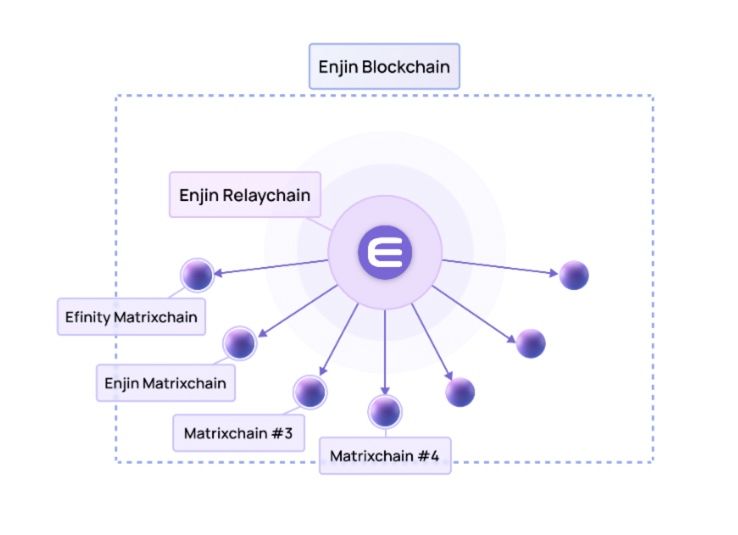 Image via Enjin.io
Image via Enjin.ioBut what does the Enjin Blockchain truly encompass? In essence, it refers to the entirety of the Enjin blockchain ecosystem. Beneath this overarching concept, various interconnected chains harmoniously operate, including the Enjin Relaychain, Efinity Matrixchain, and the upcoming Enjin Matrixchain, each serving a distinct purpose. However, for most users, interacting with the Enjin Blockchain is a straightforward process, with no requirement to delve into the behind-the-scenes intricacies.
To quote the Enjin Team:
Think of the Enjin Blockchain as a big tree. At the heart of the tree, is the Enjin Relaychain. Each unique branch that stems from the tree is a Matrixchain. Anyone (a dev, indie game dev, or a AAA studio) can create their own Matrixchain for their project, app, game, or platform. (Source)
Switching gears now to the Matrixchain, The Enjin Matrixchain takes center stage as the leading matrixchain, specifically designed with NFT-focused capabilities embedded in its protocol. The Efinity Matrixchain will be presented for consideration in an Efinity Referendum, aiming to transition and merge with the Enjin Matrixchain, adopting Substrate Enjin Coin as its native token. This pivotal move aligns the Efinity Matrixchain with the Enjin ecosystem's robust framework. Furthermore, the Enjin Matrixchain offers the flexibility for individuals to forge their own Matrixchains, providing a dynamic platform for everyone to harness the potential of their unique projects.
This is beneficial for the Enjin ecosystem as the Matrixchains are fast, scalable, secure, and cost-effective. They allow full customization for builders' specific projects and needs. The utilization of Matrixchains is also suitable for enterprise users. and large-scale teams who need to create their own Matrixchains, as not only are they scalable but the chains offer the ability to host isolated data storage on an individual chain and the creation of an internal economy focused around the users' specific chain.
Enjin JumpNet
JumpNet is Enjin’s “forever-free Ethereum scaling” solution utilizing a private proof of authority (PoA) blockchain that will allow users to execute transactions for free. It was launched in April of 2021 and saw instant adoption, with over 50 projects using the network within 2 weeks of launch.
To use JumpNet, users can bridge their ENJ tokens to JENJ (JumpNet ENJ), which is the primary governance token of JumpNet. Each JENJ is backed by one ENJ token. All of the existing Enjin products are compatible with JumpNet allowing the user experience to be seamless.
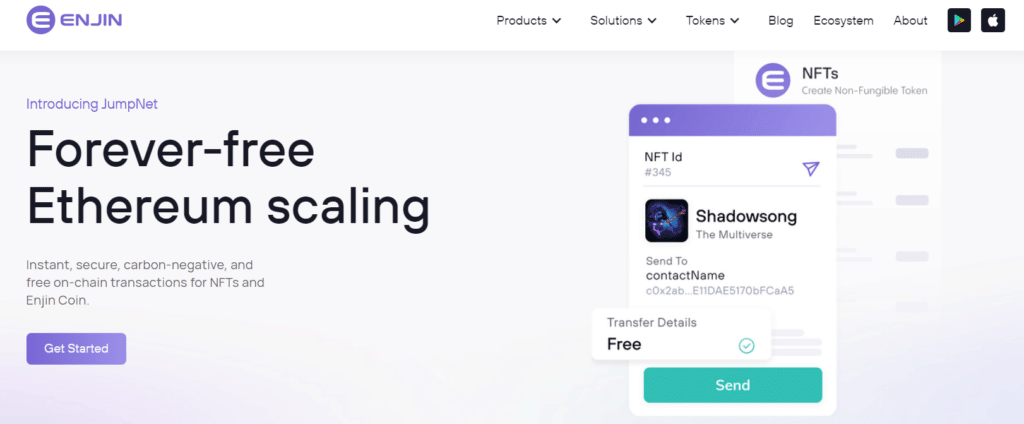
All of the transactions on JumpNet are free. However, to offer this, JumpNet imposes a series of limits against each address on the network. The current limits are 20 transactions per minute, 240 transactions per hour, and 2,880 transactions per day.
These limits are more than accommodating for the average user. However, if you require more capacity, you can do so by holding the EFI token on JumpNet (referred to as "JEFI"). Users will be able to double their JumpNet transaction limits for every 100 JEFI they hold until they reach the maximum designated limits.
ERC-1155 Support
Not only does Enjin have full support for ERC-1155 assets. Its EnjinX blockchain explorer was the first to give users access to the universe of these assets. Users can now do all of the following:
- Browse the world of ERC-1155 blockchain assets and collectibles
- Search for assets and collections by name, address, and token ID
- Verify token ownership, rarity, provenance, and authenticity
- View melts, mints, transfers, and hodlers
Basically, this is a universal catalogue to all of the in-game items across the entire Enjin multiverse. That means gamers can now easily browse gaming items and see when they were created, who made them, who owns them, what they do, and how to acquire them.
The immutable transparency of the blockchain has been brought to the gaming world.
Enjin Wallet
Everything I’ve discussed is brought together in the Enjin Smart Wallet. The Smart Wallet supports Bitcoin, Ethereum, Litecoin, Enjin Coin, and all the ERC-20 coins. More importantly, it supports all your virtual items from multiple trusted platforms and syncs effortlessly to your Ethereum address. That includes ERC-721 and ERC-1155 items.
Within the wallet, you’ll be able to trade coins and virtual game items with any other Smart Wallet user. There is support for Transaction Requests that can be sent to other wallet owners, which they will then either confirm or deny. In addition, you can set up rules or thresholds to prevent any unauthorized or undesired transactions from occurring.
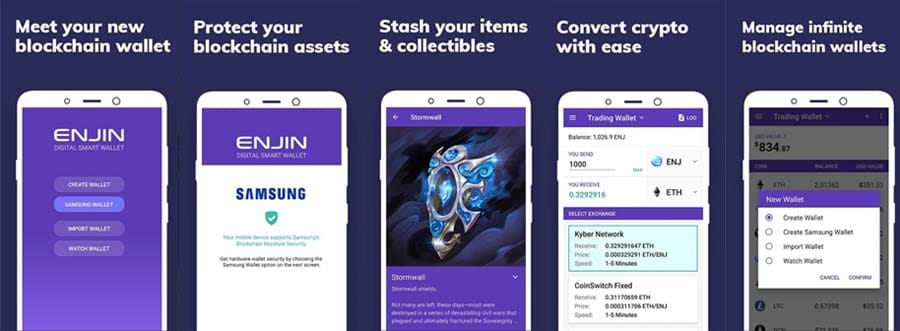 Enjin Wallet UI. Source: Google Play
Enjin Wallet UI. Source: Google PlayThe Enjin Smart Wallet was created with security firmly in mind. One of the best security features is the Secure Keyboard developed for the Enjin Smart Wallet.
This keyboard is natively part of the app. It prevents keyloggers or snoopers from seeing or capturing anything you type – including passwords and private keys. And for those who are especially security conscious, the wallet can even be set up to randomize your keys.
Adding further to the wallet's security are two separate layers of cryptography. The hardware level includes Advanced Encryption Standard. The software uses custom software encryption to encrypt any data processed by the wallet. The wallet will also block any recording or screenshots of the wallet itself right at the operating system level.
If you aren't interested in all these security features, you can also store your Enjin Coins in any ERC-20 compatible wallet, such as MyEtherWallet, MetaMask, or one of the secure hardware wallets.
The Enjin Wallet is continuously building and improving, as they launched Enjin Wallet 2.0. The updated wallet features include:
- EIP-1559 ETH Gas System- Enables priority fees and lower gas costs.
- Faster DApps Browser
- Portfolio View
- SegWit Support for Bitcoin
- View Balances in Your Local Currency
The wallet has impressive reviews with a 4.4-star rating on the IOS store and a 4.6-star rating on Google Play
Wallet dApp Browser
In May 2019, the Enjin team released a dApp browser for the Enjin Wallet, making it easier for users to complete transactions with a single click. With the Enjin Wallet dApp browser, users can:
- Log in to multiple websites to verify their asset inventory
- Input payment details when making online purchases
- Input the delivery address for the asset being purchased
With the Enjin DApp Browser, customers can sign transactions with 100% custody over their funds while enjoying new levels of security and self-sovereignty. This takes the Enjin Wallet one step closer to becoming a one-stop shop for all decentralized needs.
Enjin Coin Review: Platform
The Enjin Platform launched on the Ethereum testnet in March 2019 and has seen improvements since.
The Enjin Platform is a blockchain PaaS (Platform as a Service) that allows you to create and manage blockchain games—without the complexity of building and maintaining any blockchain infrastructure or writing any blockchain-related code.
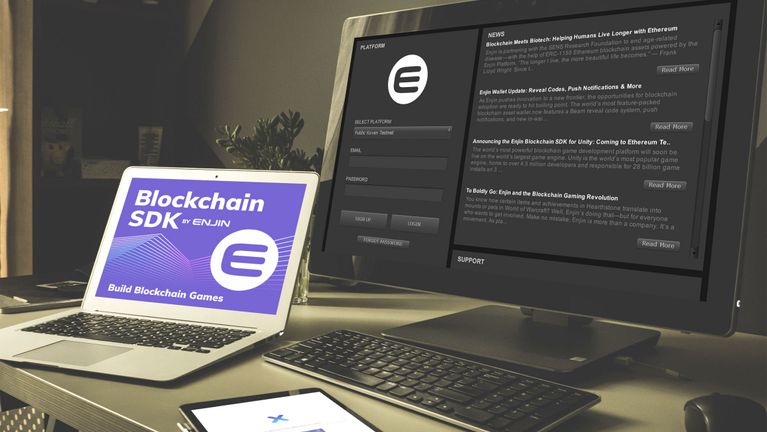 Enjin Wallet UI. Source: Enjin Blog
Enjin Wallet UI. Source: Enjin BlogIt is a robust, flexible, powerful suite of tools and services for creating groundbreaking blockchain games. Altogether, it comprises four separate but interconnected parts - Trusted Cloud, Platform API, Wallet Daemon, and Blockchain SDKs.
These tools have made it easy for developers to create new games and promise an easy way to foster mass adoption of Enjin as a gaming development platform.
- Trusted Cloud - the main backend service of the Enjin Platform; it is a cloud-hosted service that connects games to the Ethereum blockchain.
- Platform API - allows developers to query and send commands to the Enjin Platform to facilitate the development of blockchain games.
- Wallet Deamon - is a tool used to automate the authorization of transaction requests to and from the Trusted Cloud.
- Blockchain SDKs – Enjin released an SDK for Unity at the same time they released the Enjin Platform. There are also SDKs that have been released for Java, Godot, and GraphQL.
Enjin Beam
Enjin Beam is a product of the Enjin Platform that simplifies transferring and distributing NFTs assets. It allows users to receive NFTs by scanning QR codes with their Enjin wallets. These QR codes connect to smart contracts with locked Enjin NFT assets that are transferred by initiating a transaction when scanned.
This means that game creators can conduct special airdrops for users by showing them a QR code for a limited period. This allows for ease of marketing and promoting games. Beams can also be customized to place several restrictions or conditions on the claim, such as the number of times a wallet or IP address can claim a particular NFT.
The Enjin Marketplace
The Enjin Marketplace is the next step in ensuring that blockchain assets can be stored and traded as easily as possible. This is one of the major themes of Enjin in bringing blockchain to mainstream adoption.
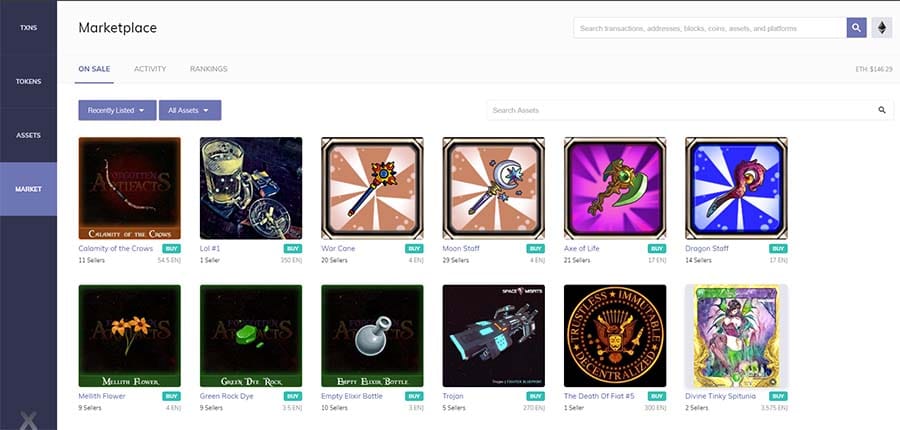 The Enjinx Marketplace UI. Image via Enjinx
The Enjinx Marketplace UI. Image via EnjinxThe addition of a marketplace to the Enjin ecosystem ensures users can experience:
- Security: No more risk of getting scammed by rogue traders. Buy assets with the full confidence that you will actually receive them, and sell with the certainty that you will be compensated for the items.
- Unified experience: Built with the UX that helps set Enjin apart.
- Ease of use: Complete transactions without leaving your mobile device.
- Seamless searching: Find on-sale assets and prices in one place.
- Transparency: Informed decision-making creates stronger markets.
The EnjinMarketplace removes friction from the trading process, allowing anyone who holds an ERC-1155 to quickly and easily list it for sale with just a few taps or clicks. And buying assets from the Enjin Marketplace is as easy as scanning a QR code.
Team & Progress
Enjin, the company that developed the Enjin Coin, has long been the largest online gaming community creation platform. The company has provided gamers with website builders, chat functions, forums, and a variety of guild and clan building tools since 2009.
Even before the creation of the Enjin Coin, the company had over 60 million monthly pageviews, 19 million registered users, and 300,000 gaming websites.
That should massively bootstrap the adoption of the Enjin Coin since the Enjin team will be rolling it out across the entire Enjin ecosystem of 300,000 websites and 19 million users.
Advisors to the project consist of Anthony Diiorio (Ethereum co-founder) and Pat LaBine (previous producer and technical director at Bioware). Enjin has also formed partnerships with Unity, PC Gamer, and NRG eSports.
 Enjin Coin Founding Team
Enjin Coin Founding TeamLate 2017 saw the team run a successful ICO, raising roughly $35 million, which is meant to be spent entirely on the project's development, marketing, and growth.
Enjin has a strong team, resources, partners and backers, which led to the development of a mobile Smart Wallet, the Platform API, Java SDK, a Minecraft plugin, the launch of the Enjin Starter launchpad, additional game plugins, the Efinity release, numerous SDKs and other improvements to the ecosystem, and is showing no signs of slowing.
There are several gaming-related projects begun, such as Enjin crypto competitors WAX and GameCredits, but none of the three has become dominant yet.
There are definite differences between the three, however, and Enjin CMO Elija Rolovic has categorized these differences by calling Enjin Coin the "Ethereum of Gaming" while calling the competition nothing more than “tokenizing their centralized games/marketplaces.”
The Enjin Roadmap
You can find the Enjin Roadmap on the Enjin Coin site. There are many exciting developments on the way, not the least of which was the partnership with Efinity. Efinity added a sidechain to the Enjin blockchain acting in a similar fashion to what the Lightning Network did for Bitcoin.
Enjin has made vast improvements including the launching of its own network, continual updates to the Enjin Wallet, Efinity updates, enterprise solutions, and the yet-to-be-released NFT.io Marketplace, which aims to be a cutting-edge marketplace poised to revolutionize the world of NFTs. NFT.io will encompass all the essential functionalities expected from a top-notch NFT marketplace, with the added advantage of potential integration with Efinity.
If you’re interested in seeing what the Enjin team has already accomplished, look at the Enjin Timeline posted by the team, and further updates can be found on the Enjin Development Updates Blog.
The Enjin Coin (ENJ)
The total supply of Enjin Coins (ENJ) is 1 billion, with just a bit over 750 million of them in circulation. 80% of the ENJ were distributed during the crowdsale, while the remaining 20% were split between the Enjin team and advisors.
The circulating supply of Enjin crypto coins can be expected to continue falling because anytime a custom asset is created, the corresponding amount of ENJ is removed from circulation. This is expected to increase the value of ENJ tokens over time.
Efinity Token (EFI)
EFI is the native token of Enjin's Efinity parachain on Polkadot and will be the first-ever 'paratoken' (a token standard compatible with the Polkadot and Kusama ecosystems) on the network. EFI will also exist on the Enjin Blockchain and is used to pay transaction fees, reward network participants, vote in governance events, and maintain the liquidity of fungible and non-fungible tokens on the network.
The total supply of Efinity Coin (EFI) is 2 billion, with a current circulating supply of roughly 169 million EFI (8%) tokens. The token distribution of EFI is as follows:
- The ecosystem was given 35% of the overall supply to finance its expansion,
- The Enjin parent company was given 20%,
- The project team was given 10%.
- 15% of the supply was left available for staking and pools to encourage participation.
- Finally, investors in the private and public sale rounds, which took place months ago, were given 15% and 5%, respectively, of the proceeds.
To incentivize participation from users on the network, the EFI token is issued as rewards to:
- Collator Nodes who run the network.
- Users who govern the direction of the network.
- Buyers and sellers who facilitate price discovery.
- Developers who propose projects built on Efinity are eligible for grants from the Community Pool.
- Early adopters and creators increase their token value with bonding curves and liquidity.
Buying & Storing ENJ
Enjin token can be purchased on most of the major exchanges, we recommend Binance, OKX or Bitget.
 Register at Binance and Buy ENJ Tokens
Register at Binance and Buy ENJ TokensEven though Binance holds the majority of the trading volume, the rest of the volume is pretty well distributed across the other exchanges. This bodes well for the price discovery of ENJ tokens as there are more exchanges to close mispricings.
Once you have your ENJ, you will want to store it in a secure offline wallet. Perhaps your best bet is Enjin's own wallet. However, given that this is an ERC20 token, you can store it in any Ethereum compatible wallet, including hardware wallets.
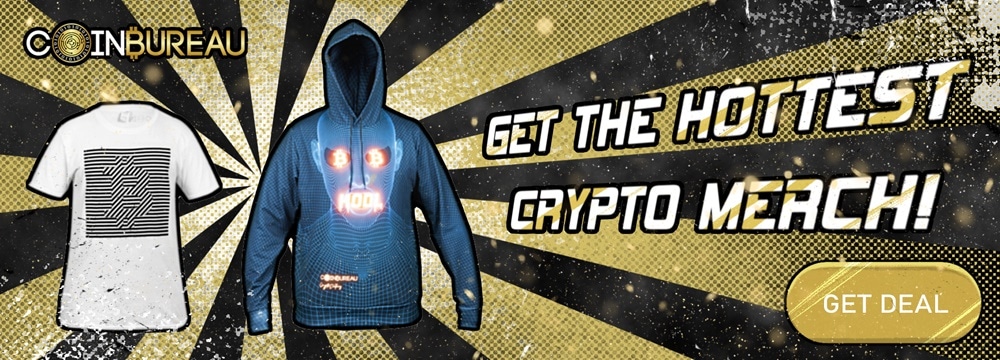
Enjin Coin Review: Closing Thoughts
The Enjin Coin is looking to provide a benefit to the $17 billion virtual goods market. By placing game assets on the blockchain, they hope to prevent fraud in the industry, which some measures have suggested affects roughly 80% of all transactions.
That would be a considerable improvement for the gaming industry and gamers. With the huge customer base that Enjin already has, the coin should reach large-scale adoption reasonably quickly. The fact that Enjin is also providing bespoke solutions for individual projects and enterprises through the use of its Enjin blockchain leads to the upside potential being essentially limitless, especially if we frame Enjin as being “the Ethereum for Gaming and NFTs.”
That said, it remains a new project and unproven as well. So far, the team has done well in meeting their roadmap goals, and they will need to continue doing so if they want to prove the viability of the Enjin Coin.
Their partnership with Unity should help drive them towards one of their goals, which is the creation of actual games on the blockchain, which will help drive further adoption of the Enjin Coin. Nothing is proven yet, but the project does look to have a bright future.
Heading into 2024, we’ve seen impressive progress from the Enjin project, with the addition of an easy-to-use blockchain explorer, a sophisticated wallet with an in-wallet dApp browser, the Enjin Blockchain, Efiniti improvements and advancements, enterprise solutions, and a marketplace that allows gamers to easily buy and sell the assets acquired in the multiverse games.
The continued expansion will help drive adoption, but what the project really needs now is a blockbuster game that draws in millions of players. With that one blockbuster, they could bring the ENJ coin and the Multiverse into mainstream gaming.





